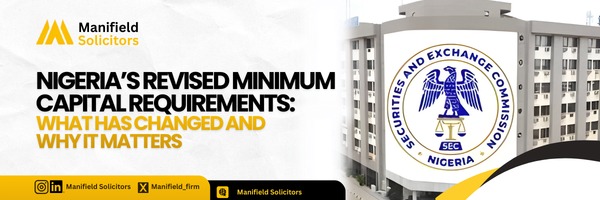The regulation of digital assets in Nigeria has entered a more coordinated phase, following years of fragmented oversight between the Central Bank of Nigeria (CBN) and the Securities and Exchange Commission (SEC). While both regulators exercise distinct statutory mandates, with the CBN overseeing payment systems and financial stability, and the SEC supervising investment and capital market instruments, the absence of clear alignment created uncertainty for market participants. Recent initiatives by both agencies signal a strategic shift toward cooperation, aimed at achieving regulatory stability, investor confidence, and market integrity in Nigeria’s growing crypto-asset ecosystem.
Evolving Regulatory Context
The CBN’s Guidelines on the Operations of Bank Accounts for Virtual Asset Service Providers (VASPs), issued on the 22nd of December 2023, formally reversed its earlier prohibition on banking services for crypto-related businesses. The Guidelines permit regulated financial institutions to open designated accounts for licensed VASPs, subject to stringent Know-Your-Customer (KYC), Anti-Money Laundering (AML), and counter-terrorist financing (CFT) controls. This marked a major policy shift from the CBN’s 2021 circular, which had effectively excluded crypto-related firms from the formal banking system.
In parallel, the SEC’s Rules on Issuance, Offering Platforms, and Custody of Digital Assets (May 2022) remain the foundational framework for digital asset supervision. These Rules classify various tokenised instruments as securities and require issuers, custodians, and platforms to register with the Commission.
Together, these instruments establish the first dual-layer regulatory framework for virtual asset activities in Nigeria.
The Legal Anchor: The Investments and Securities Act 2025
The Investments and Securities Act 2025 (ISA 2025) provides the statutory recognition that was previously lacking. Section 357 expressly defines digital and virtual assets as securities where they satisfy the characteristics of investment instruments. This codification vests the SEC with jurisdiction over such assets, aligning its oversight with the existing Rules.
The ISA 2025, therefore, bridges the statutory gap between the SEC’s regulatory powers and the CBN’s prudential responsibilities, providing the legal foundation for structured inter-agency collaboration.
Collaboration in Practice
Since late 2024, both regulators have established joint technical committees and have exchanged policy inputs on licensing, custody standards, and AML supervision. The CBN’s 2023 Guidelines expressly recognise the SEC as the competent authority for licensing and monitoring VASPs. Likewise, the SEC acknowledges the CBN’s supervisory role over payment systems and settlement channels.
This cooperative stance demonstrates a conscious effort to prevent regulatory overlap and to promote consistent market rules. On the 30th of September, 2025, during the CBN Inaugural Governor’s Annual Lecture Series, the CBN Governor stated that there are ongoing discussions towards developing a sustainable regulatory framework for digital assets expected to produce harmonised compliance and reporting standards for digital-asset operators.
Implications for Regulatory Stability
A harmonised regulatory approach between the CBN and SEC strengthens legal and policy predictability, an essential precondition for investment and innovation within the digital-asset market.
- It allows VASPs to access the banking system legally while remaining subject to capital-market disclosure and custody standards.
- It reduces the risk of conflicting directives that previously undermined investor confidence.
- It positions Nigeria to align with international best practices under the Financial Action Task Force (FATF) recommendations and emerging African Union frameworks for digital-asset supervision.
However, stability will ultimately depend on sustained inter-agency dialogue, consistent enforcement, and the timely issuance of the joint framework currently under review.
Outstanding Challenges
Notwithstanding the notable progress in aligning regulatory objectives, several structural and operational gaps continue to constrain the full realisation of a stable digital-asset regime
- The absence of a formal Memorandum of Understanding (MoU) between the CBN and SEC leaves a grey area in regulatory interpretation, particularly in the classification of tokens and the delineation of enforcement jurisdiction.
- Custody and consumer-protection standards remain insufficiently developed, exposing retail investors to operational and counterparty risks without a unified supervisory protocol.
- Cross-border enforcement, data sharing and taxation frameworks are yet to be harmonised with the CBN, SEC, Federal Inland Revenue Service (FIRS), and the Nigeria Financial Intelligence Unit (NFIU), creating inconsistencies in oversight and compliance expectations.
Effectively addressing these deficiencies will determine whether the present inter-agency collaboration evolves into a durable model of regulatory stability or remains a transitional administrative arrangement.
In conclusion, the ongoing collaboration between the CBN and the SEC represents a defining moment in Nigeria’s regulatory evolution for digital assets. It signals a transition from fragmented and restrictive oversight to a coordinated, risk-based approach that seeks to balance technological innovation with market integrity and systemic stability. Although complete regulatory harmony is still a work in progress, both regulators have clearly indicated that sustained dialogue and institutional cooperation, rather than unilateral restrictions, will shape the trajectory of virtual-asset governance in Nigeria.







Add your first comment to this post